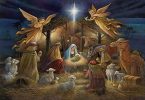The Baptism of the Lord (Year B)
Scriptures: Is. 55:1-11; Is. 12:2-3, 4, 5-6; 1 Jn. 5:1-9; Mk. 1:6-11
The feast of the baptism of the Lord has its own significance in the liturgical calendar. It is the third epiphany in a series where we are introduced to Jesus as the Messiah. It was done during Christmas where the shepherds were told about the birth of Jesus. Secondly, last Sunday (we celebrated the feast of Epiphany of the Lord) where the birth of Jesus was revealed to the three wise men from the east (Gentiles). Thirdly, through the baptism of the Lord, God himself revealed the true identity of Jesus as his ‘Beloved Son’.
Today, we end the Christmas season and enter into the ordinary time. It directs our thoughts and guides into recognizing our true identity and mission in this world. It reminds us of our baptism. We were baptized in Jesus Christ and we bear the name of Christ. Thus, the feast has special significance to all of us.
The feast of the baptism of the Lord reveals the true identity and mission of Jesus to us. The Gospel according to Mark starts with the mission of St. John the Baptist. The next verses introduce Jesus to the readers. Jesus came to be baptized by John the Baptist. But the Gospel records three unusual things that happened when Jesus came up from the water; the heavens opened, the Holy Spirit came in the form of a dove and the voice came down from heaven saying, “Thou art my beloved Son; with thee, I am well pleased.”
Each of these three things points to the fact of Jesus’s true identity and his mission in the world. Mark along with the rest of the evangelists tells us that heaven was opened when Jesus came up from the water. What does it mean that heaven opened? There are many references to the opening of heaven in the bible. The primary passage is from the book of Isaiah. The prophet says, “oh, that you would rend the heavens and come down, that the mountains would tremble before you.” (Is 64:1). In Noah’s days, the floodgates of the sky were opened (Gen. 7:11), Jacob got the vision of the ladder coming down from the opened heaven. (Gen. 28); Prophet Ezekiel also saw heaven opened when he was by the river Chebar in exile (Ez. 1:1); Stephen saw heaven opened at his martyrdom (Acts 7:56); John saw the vision of heaven opened (Rev. 4) Each of these references tell us that the person who saw heavens opened was in need of God’s blessings. The prevailing situation was not so conducive. At the baptism of Jesus, God reveals to us that he wants to have a relationship with us. It is God’s initiative to solidify the covenant that he had made with man.
The second was the Holy Spirit who came in the form of a dove and rested on Jesus. It is interesting to note the symbolic meaning of the dove in the scriptures. There have been some references to the dove in the old testament. In the last days of the great flood, it is said that Noah sent a dove in search of dry land. The dove made several attempts. Finally, it brought a fresh olive leaf (Gen. 8:11). Thus, the dove became a symbol of peace, hope and new life. Moses also directed Israelites to make sacrificial offerings. Those who could not afford one of the more expansive offerings, they could offer doves and turtledoves. (Lev. 12:6; Lk. 2:24). Doves were perceived as a symbol of purity. Therefore, it was used for sacrifice just like the lamb. The writer of the book Song of Songs also mentioned, “How beautiful you are, my darling, how beautiful you are! Your eyes are like doves” (1:15) The psalmist also desired to have wings of a dove so that he might find rest for himself (Ps. 55:6). All these references revealed to us Christ’s divinity, his purity, his anointing and he was sent by God. Coming of the Holy Spirit means to declare that Jesus is the prince of peace, he is the promise of new life, he is pure and perfect and there is no one like him in the world.
The third was the voice which came down from heaven. The Gospel records three occasions where the voice came down to Christ. Apart from today’s Gospel, the second occasion was at the transfiguration (Mk 9:7) and the third was in the last week of Jesus’ life (Jn. 12:28). All three occasions are seen in the context of Jesus’ final destiny. The second and the third occasions are easily understandable but the first one needs a little explanation. The voice at the time of baptism is a dialogue between the two divine persons. Mark does not record that the voice was heard by the people. The evangelist chooses the words in the divine voice which are familiar to the Old testament passages. God calls the king, “You are my son; today I have begotten you” (Ps. 2:7). In Isaiah, God calls the suffering servant, “Here is my servant, whom I uphold, my chosen one in whom I delight…” (Is. 42:1). The evangelist carefully chooses these words to show how Jesus would faithfully carry out his Father’s will. He would be like Isaac, the beloved of son of Abraham (Gen. 22:12). God the Father will offer his life in sacrifice to save mankind. Thus, Jesus is God’s beloved son who would carry out his will faithfully in his death.
Jesus’s baptism reveals to us that God stooped down from heaven to become a man. He was sinless yet he went to receive the baptism of repentance. The river Jordan was a place where sinners came to receive God’s pardon. Jesus’ immersion in the water symbolizes Jesus dying with us in this world. His coming up from the water is equivalent to his rising from the dead. We need to believe that Jesus is the one who opens the heavens for us so that we may reunite with our loving God. Jesus is the prince of peace; he is the promise of new life. It has been revealed by the Holy Spirit. Jesus is the beloved son of God. There is none like him. The celebration of the baptism of the Lord is an invitation to recognize the identity and mission of Christ. Let us reflect on our baptism and ask ourselves what is my identity and mission in the world?






